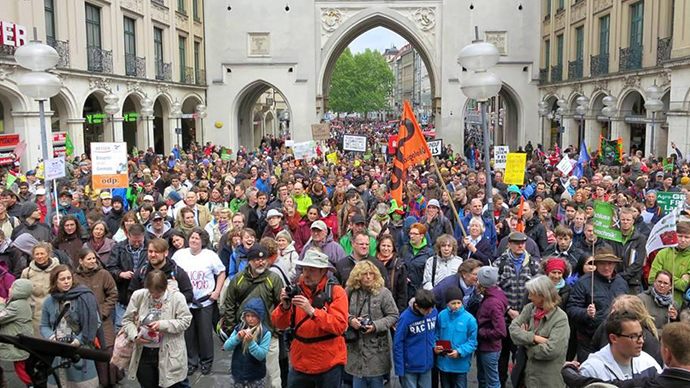
Published time: May 31, 2013 17:28
Edited time: June 01, 2013 15:37

The march against Monsanto, Germany. (Image from twitter user@@HarvestPM)
Monsanto plans to halt lobbying for its genetically
modified plant varieties in Europe due to low demand from local farmers,
a representative from the US agricultural giant told a German daily.
"We are no longer working on lobbying for more cultivation in
Europe," Brandon Mitchner a representative for Monsanto’s
European branch, Tageszeitung, said in an interview set to be
published on Saturday.
"Currently we do not plan to apply for the approval of new
genetically modified crops. The reason is, among other things,
low demand of the farmers,” he continued.
A spokeswoman for Monsanto Germany, Ursula Luttmer-Ouazane,
admitted that Monsanto recognizes that GMO crops were currently
not embraced on the European market.
"We've understood that such plants don't have any broad
acceptance in European societies," Luttmer-Ouazane said.
“It is counterproductive to fight against windmills," she
added.
A spokesperson for the German Ministry of Economy and
Technologies described the move as an
“entrepreneurial
decision” which needed no further comment. The ministry
added, however, it has long made its opposition to gene
modification technologies known.
"The promises of the GM industry have not come true for
European agriculture, nor have they for the agriculture in
developing and emerging economies," the ministry said in a
statement.
Eight national governments in the European Union have already
banned Monsanto's MON810 maize and other forms of GMO cultivation
in their countries under an environmental protection provision
known as the 'Safeguard Clause'.
Particularly fierce protests in Germany prompted the government
to introduce the measures in 2009 due to concerns that such
cultivation could lead to ecological degradation.
Monsanto’s rivals, such as Bayer CropScience, BASF and Syngenta,
had by and large pulled out of the German market because of
large-scale public opposition, the German daily reported.
Austria, Bulgaria, France, Greece, Hungary, Luxembourg and most
recently Poland are among other EU member states enforcing the
ban. In April, Italy joined the ranks of EU states looking to ban
the cultivation of GM crops on its soil.

The march against Monsanto, Germany. (Image from twitter user@Julia_etc)
The announcement comes amidst a series of recent public relations
battles that have brought the US firm considerable worldwide
attention.
On Wednesday, the US Department of Agriculture (USDA) said it had
conducted genetic tests on wheat from an 80-acre farm in Oregon
this past April. The
tests revealed the wheat was an experimental variety
created by Monsanto that had never been approved for sale.
The discovery prompted Japanese authorities
to cancel part of a tender offer to buy US western
white wheat and have suspended imports of both that variety and
feed wheat, while several other large importers of US-wheat
throughout Asia said they were closely monitoring the situation.
The European Union for its part said it will test any incoming
shipments, with plans to block those containing GMO wheat.
The USDA announcement followed a massive, global "March Against
Monsanto" held on Saturday that saw demonstrations against the
Missouri-based firm in 52 countries. Organizers for the
global protest said around
2 million protesters showed up at rallies being held
in 436 cities to protest against the seed giant and the
genetically modified food.

The march against Monsanto, Munich. (Image from twitter user@nasimjo)





No comments:
Post a Comment